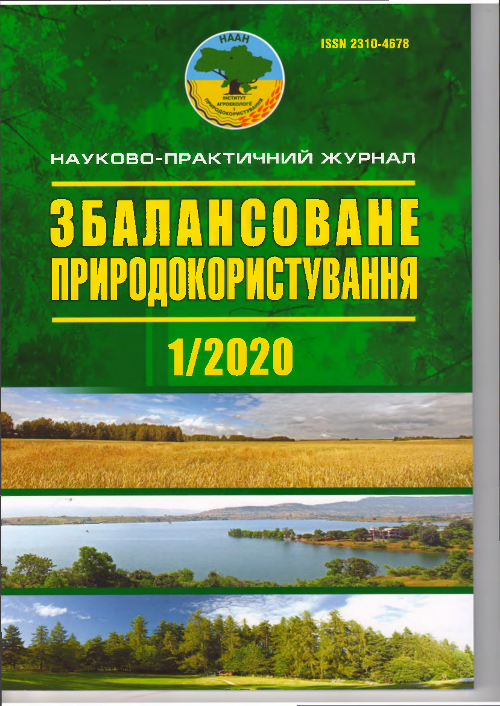THE ROOT METABOLITES OF SUNFLOWER PLANTS AS FACTOR INFLUENCE ON THE VIABILITY OF PHYTOPATHOGENIC FUNGUS ALTERNARIA ALTERNATA (FR.) KEISS
DOI:
https://doi.org/10.33730/2310-4678.1.2020.203936Keywords:
sunflower hybrids, phytopathogenic micromycetes, exometabolites, allelopathyAbstract
The presented results evaluating influence root metabolites hybrids sunflower Dushko and Oliver are on physiology properties and reproductive ability fungus Alternaria alternata (Fr.) The installed that root metabolites of sunflower hybrids Dushko and Oliver, depending on the technology cultivation, able as inhibit and stimulate the growth of phytopathogenic fungi also to influence on the intensity him sporification.
For results of the study established that the root metabolites of plants sunflower hybrid grown by organic technology, much reduce the intensity of sporulation fungus, compared with hybrids grown by traditional technology. Identified that the root metabolites of plants sunflower hybrid grown by organic technology are able to reduce degree of infectious loading in agrophytocenoses during the growing season and accordingly reduce degree of biological contamination by the phytopathogenic fungus A. alternata. The root metabolites of sunflower hybrids Dushko and Oliver are differentiated for influence on the speed of radial growth mycelium and the intensity of sporulation fungus.This is shows their different antifungal activity.This indicator should be used for ecological research of sunflower hybrids as a factor of biological pollution of agrocenoses, that will allow to managing the stability of agroecosystems and receiving ecologicalpure plant products
References
Antoniak, H.L., Kalynets-Mamchur, Z.I., Dudka, I.O., Babych, N.O., Panas. N.Ie. (2013) Ekolohiia hrybiv: monohrafiia. Lviv: LNU imeni Ivana Franka, 628 s. — (Seriia «Biolohichni Studii»). — Bibliohr.: s. 455–627 (In Ukr.).
Muhammad, Z., Inayat, N., Majeed, A. [et al.] (2019) / Allelopathy and Agricultural Sustainability: Implication in weed management and crop protection / European Journal of Ecology.
Cheng, F. (2015). Research Progress on the use of Plant Allelopathy in Agriculture and the Physiological and Ecological Mechanisms of Allelopathy. Frontiersin Plant Science, 6, 1020.
Jabran, K. (2017) Sunflower allelopathy for weed control. In: Manipulation of allelopathic crops for weed control / K.Jabran// 1st edn. Springer Nature International Publishing. Р. 77–86.
Iqbal, А., Hamayun, М., Khan, Z.H. [et al.] (2019) Plant sare the possible source of allelochemicals that can be useful in promoting sustainable agriculture / Fresenius Environmental Bulletin. Vol. 28 (2 A). — Р. 1040–1049.
Schandry, N., Becker, C. (2019) Allelopathic plants: models of studing plant — interkingdom interactions. Trends Plant Sci. 25(2) 176-185. Doi: 1016/j.tplants.2019.11.004
Broeckling, C.D., Broz, A.K., Bergelson, J., Manter, D.K. & Vivanco, J.M. (2008) Root exudates regulate soil fungal community composition and diversity. Appl. Environ. Microbiol. 74, 738–744
Naumov, G.F. (1988). Allelopaticheskie svojstva vydelenij prorastajushhih semjan polevyh kul’tur i ih sel’skohozjajstvennoe znachenie [Allelopathic properties of secretions of germinating seeds of field crops and their agricultural significance]. Allelopatijai produktivnost’ rastenij [Allopathy and plant productivity]. Kharkov (In Rus.).
Nasinnia silskohospodarskykh kultur. Metody vyznachennia yakosti [Seeds of agricultural plants. Methods for quality determination]. (2002). DSTU 4138:2002 from 01 January 2004 from 01 January 2002. Kyiv: Derzhspozhyv standart Ukrainy (In Ukr.).
Beznosko, I. (2013). Vplyv metabolitiv sortiv percya solodkogo na intensyvnist sporoutvorennya mikromiceta Alternaria solani (Ell. et Mart.) [Effect of metabolites of sweet pepper varieties on the spore formation intensity of the micronucleus Alternaria solani (Ell. et Mart.)]. Ahroekologichnyi zhurnal — Agroecological Journal, 2, 106–109 (In Ukr.).
Downloads
Published
Issue
Section
License
- The authors reserve the right to authorship their work and pass the journal the right to publish this work under a Creative Commons Attribution License license, which allows other persons to freely distribute the published work with the obligatory The authors of the original work and the first publication of this magazine.
- The authors have the right to make independent additional agreements on the nonexclusive dissemination of the work in the form in which it was published by this magazine (for example, to post work in the company's electronic storage or to publish as a monograph) , subject to the first publication of the link to this journal.
- Journal policy allows and encourages the placement of authors on the Internet (for example, in the repositories of institutions or on personal websites) manuscript work as to the presentation of this manuscript to the editorial board and during its editorial processing, as it contributes to The productive scientific discussion and positively affects the efficiency and dynamics of citation published work (see The Effect of Open Access).


